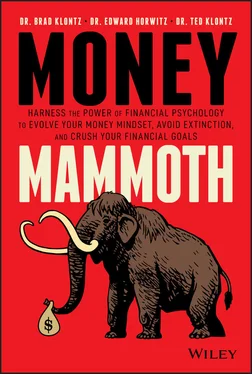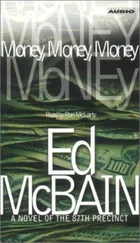SECTION I YOUR ORIGINS
This is the story of James and Alex, both of whom grew up in wealthy families. Both have more money at their disposal than they could spend in a lifetime. Both are surrounded by conspicuous luxury, and they have had the best education that money can buy. They eat the finest foods; they wear the finest clothes, and they run in the most elite social circles. They are financially set for life. In terms of material possessions, they have it all. Their wealth is not only profound, it is generational. Both come from families that have been wealthy for generations. Even though they come from similar places, they are very different people.
James is a spoiled brat. His life consists of parties late into the night and sleeping in almost every day. He doesn't do anything productive. He doesn't work. He mistreats service providers. In fact, he can be downright cruel. Even though his parents have given him everything he wants, he resents them. He drinks too much; he eats too much, and he gambles incessantly. Inside, he feels bad about himself. He feels lost, purposeless, depressed.
Alex, in contrast, lives a very different life. He wakes up early each morning, and spends much of the day strategizing how he can leverage the financial gifts he has been given in ways that are consistent with his and his family's basic value of making the world a better place. He feels a sense of responsibility to be a good shepherd of the gifts he has been given. He is interested in knowing how he can increase his wealth so that he can do even more good things. He exercises rigorously to keep himself in peak physical condition. He is a practitioner of meditation and yoga. Though he didn't have to, he joined the military service, risking life and limb for his family and his country. He has spent years forgoing all of the pleasures that his family's money could have provided for him in an effort to make a name for himself and enhance the family legacy. He hopes to gain prominence as an officer and return home to enter politics. He is deeply connected to his family history. He appreciates what his parents, grandparents, and great grandparents have done for him and his family. In fact, he knows all about each of them: how they each made a living, what they worked at, and what they accomplished. He is driven to elevate his family's wealth and its status, and to pass this legacy down to his own children and grandchildren as he helps make the world a better place.
These two young men come from similar wealth, but have developed into very different people. Both were given every opportunity. One is passionate, appreciative, and ambitious. The other is depressed, resentful, and purposeless. It is human nature to seek pleasure and avoid pain. So it's easy to understand why someone like James, who has everything, might sit back and enjoy it.
So this begs the question: Why would an incredible rich young man, someone who has more money than he could ever need, someone who is living in the lap of luxury and comfort—why would he join the military, forego comfort and pleasure, risk his life, and be so utterly focused on growing his family's wealth and status?
To answer that question, we will visit ancient Rome. Two thousand years ago, Rome was the most powerful civilization in the world. Its aristocrats were incredibly wealthy. They lived in sprawling estates, had slaves to do their manual labor, and received the best education and health care available. The story of Alex mirrors that of many of the children of Roman aristocrats. The clearest path to wealth and status was political, and the quickest path to political office was a resumé of military accomplishments. To this end, these young men would sacrifice all the luxury and comfort that Rome provided to travel thousands of miles away and risk health, life, and limb in the pursuit of military distinction.
The short answer as to why young men behaved that way: It was all about their ancestors. Roman aristocrats had a tradition of making wax masks of the men in their families. The masks were usually made when someone reached the age of 40 and only if he had achieved a noteworthy political rank. The mask was a sign that he had achieved the minimal level of social status needed to be recognized as successful within the family. The mask showed that he was on a similar path to achievement and social prominence as his ancestors who were similarly recognized. These masks were stored in the reception room of their atriums and were arranged next to labels of the highest political offices held by each person. They were worn by actors during funeral processions, but were also shown to visitors.
Next to the collection of wax masks was a chart illustrating the family tree, with painted portraits of the ancestors. Nearby would also be a collection of armor and weapons captured by their ancestors, prominently displayed family achievements that would be seen by anyone who visited the home.
Located in the entryway and near the center of the villa, these tributes to the family's history and accomplishments were displayed for all to see. It would not have been uncommon for the family to walk visitors through the space, showing off the military trophies and political distinctions and telling stories about the trials, tribulations, and achievements of their ancestors.
Imagine what it would have been like to have been a child growing up in such a home, hearing stories about the various artifacts, pictures, and accomplishments of your ancestors, which were so prominently displayed. What must it have been like to have been shown a sword taken from a Carthaginian officer by your great-great grandfather in the Battle of Agrigentum in Sicily or hearing about how your grandfather helped restore Roman honor as a general in the Battle of Carthage in North Africa?
This deep connection to the past would help you make sense of the privilege you were now enjoying, and more important, the sense of duty and responsibility that accompany your privilege. Imagine how your self-esteem would be bolstered as you were told that you, as a direct descendent, have the same blood coursing through your veins. That the traits of courage and wile are built into your very being. You would believe that the highest levels of accomplishment for you are not only possible but are expected. That your ancestors are watching you, supporting you, and encouraging you to take the family to the next level. It is not hard to imagine that growing up in this way, you might develop an intrinsic motivation to do your part to maintain and grow your family's wealth and status and the belief that you could do it.
SO WHAT'S IN YOUR ANCESTRY ROOM?
When was the last time you visited someone's home and saw busts and portraits of their ancestors lining their walls? Interestingly, some of the most generationally successful families do have pictures of their ancestors displayed prominently, but for most of us, this is just not the case. It makes sense though, because, for rare exceptions, many of our ancestors never achieved significant fortune or status and few could afford an artist to paint a portrait. Many Americans are the descendants of immigrants. Aside from the occasionally wealthy adventurer, no one in their right mind would choose to leave a life of wealth and privilege to get on a boat and travel across the world to start over in a country where they knew no one and often didn't even speak the language.
If there were busts of your ancestors, with the possible exception of your parents or grandparents who may have been able to capitalize on the opportunities for socioeconomic advancement, the busts would likely not be of those who accomplished great things as measured in our culture or by ancient Roman standards. Instead you would see pictures and artifacts of refugees, indentured workers, slaves, and immigrants.
Читать дальше












